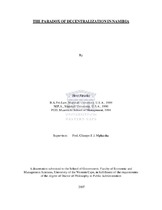| dc.contributor.advisor | Mphaisha, J.J | |
| dc.contributor.author | Riruako, Hoze | |
| dc.contributor.other | School of Government | |
| dc.contributor.other | Faculty of Economics and Management Sciences | |
| dc.date.accessioned | 2013-09-11T12:54:03Z | |
| dc.date.available | 2007/09/21 15:01 | |
| dc.date.available | 2007/09/21 | |
| dc.date.available | 2013-09-11T12:54:03Z | |
| dc.date.issued | 2007 | |
| dc.identifier.uri | http://hdl.handle.net/11394/2097 | |
| dc.description | Philosophiae Doctor - PhD | en_US |
| dc.description.abstract | It was the purpose of this study to demonstrate that the government of Namibia has been seeking to adopt structures and procedures that will contribute to the realization of general national development. Decentralization in any country takes place in a political context and its implementation assumes some political significance, as it is not merely a matter of centralization or decentralization of government functions and procedures, but both centralization and decentralization tendencies exist and reinforce each other in practice. This study argues that the dynamic features of decentralization and its implementation in Namibia have been shaped by central government's view, through the ministry of regional and local government and housing, of the concept decentralization. The objectives of this study were to provide a critical understanding of the theoretical foundation of the concept decentralization. | en_US |
| dc.language.iso | en | en_US |
| dc.publisher | University of the Western Cape | en_US |
| dc.subject | Decentralization in government - Namibia | en_US |
| dc.subject | Regionalism - Namibia | en_US |
| dc.title | The paradox of decentralization in Namibia | en_US |
| dc.type | Thesis | en_US |
| dc.rights.holder | University of the Western Cape | en_US |
| dc.description.country | South Africa | |

